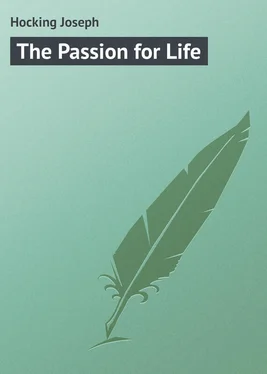Joseph Hocking - The Passion for Life
Здесь есть возможность читать онлайн «Joseph Hocking - The Passion for Life» — ознакомительный отрывок электронной книги совершенно бесплатно, а после прочтения отрывка купить полную версию. В некоторых случаях можно слушать аудио, скачать через торрент в формате fb2 и присутствует краткое содержание. Жанр: foreign_prose, Зарубежные любовные романы, на английском языке. Описание произведения, (предисловие) а так же отзывы посетителей доступны на портале библиотеки ЛибКат.
- Название:The Passion for Life
- Автор:
- Жанр:
- Год:неизвестен
- ISBN:нет данных
- Рейтинг книги:4 / 5. Голосов: 1
-
Избранное:Добавить в избранное
- Отзывы:
-
Ваша оценка:
- 80
- 1
- 2
- 3
- 4
- 5
The Passion for Life: краткое содержание, описание и аннотация
Предлагаем к чтению аннотацию, описание, краткое содержание или предисловие (зависит от того, что написал сам автор книги «The Passion for Life»). Если вы не нашли необходимую информацию о книге — напишите в комментариях, мы постараемся отыскать её.
The Passion for Life — читать онлайн ознакомительный отрывок
Ниже представлен текст книги, разбитый по страницам. Система сохранения места последней прочитанной страницы, позволяет с удобством читать онлайн бесплатно книгу «The Passion for Life», без необходимости каждый раз заново искать на чём Вы остановились. Поставьте закладку, и сможете в любой момент перейти на страницу, на которой закончили чтение.
Интервал:
Закладка:
"Yes, yes, certainly," and I thought he seemed a little bit uneasy.
"Mr. Trelaske," I said, "what happens to a man after he is dead?"
He was silent for a few seconds, and again he looked at me as if he doubted my sanity.
"I am not joking," I persisted. "After all, it is a matter of some interest to me, and as you are a clergyman, and as a belief in a future life is one of the articles of the faith you preach, I thought I would ask your opinion about it."
"But surely, Mr. Erskine," he said, "you are not a heathen. You are an old 'Varsity man. You took an arts degree, and would, to say the least of it, have had to study the Greek Testament. You know what is taught there."
"Excuse me," was my reply, "but that doesn't quite meet the situation. It is quite true, as you say, that I had to study the New Testament at Oxford, and also while at school at Winchester I was in a Confirmation Class; but all that kind of thing is a long way off. It is simply traditional, and when a man comes down to the depths of life traditions don't count. It is true that I have not read the New Testament lately, not, indeed, since I left Oxford. I am like thousands of other fellows, who, on going out into the world, give these things the go-by. Years ago I suppose I held to the traditional faith, although I have troubled very little about it; but now, as things are, I am interested – I am more than interested. What will happen to me a few months hence, when I am dead? Anything?"
I could quite see that he was surprised at the course the conversation was taking, and that he had no expectation of being asked such questions; but now that I had spoken, I meant to know all that he could tell me.
"Our state in the future," was his reply, "depends on the life we have lived here."
"Isn't that rather begging the question?" I asked. "You are assuming something which, as it seems to me, is a matter of doubt. No, do not mistake me, I haven't lived a bad life. I have not descended to the vulgar vices which are supposed to be so common to men in these days. I have, as my acquaintances say of me, 'gone straight.' I listened very attentively to your sermon on Sunday night. You see, I was more than ordinarily interested. Your text was, 'If a man die, shall he live again?' Will he, Mr. Trelaske?"
"Of course," was his reply.
"Are you sure ?" I asked, emphasizing the word.
"Hasn't it been the teaching of the Church from its earliest history?" and he looked a little indignant.
"Excuse me, but if you will forgive me for saying so, the teaching of the Church is the very thing in question. As you may imagine, I do not ask the question out of idle curiosity; I am deeply interested, vitally interested. Mr. Trelaske, are you sure, if I were to die to-night, that there would be anything after? Mind you, I do not ask for a mere opinion; we all have those, but is it a matter of certainty with you?"
"As I said on Sunday night," he replied, after some silence, "spiritual things are spiritually discerned; and immortality is a matter of the spirit, isn't it?"
"I am afraid I don't follow you," I replied. "As you said just now, I am a lawyer, and my business for several years has been to test evidence. After I have tested the evidence that has been brought in support of any particular case, it has been my business to convince the jury that the evidence is conclusive. If I don't convince the jury, of course I fail to win my case. Your answer suggests that I lack the qualities to understand the proofs in support of the doctrine you taught on Sunday night. Perhaps you are right; probably I have so neglected what you call the spiritual part of me that it has become atrophied. I will put it in another way, then, and, believe me, it is furthest from my desire to be impertinent. Supposing you were to die to-night – you, an ordained clergyman – are you sure there is a life beyond?"
Mr. Trelaske was silent.
"Forgive my asking you," I said. "I am afraid I have been frightfully rude; but you see, living here alone, with the doctor's verdict constantly before me, I am curious to know."
"Not at all, not at all," he said hastily, "I am very glad you asked me; but the question is so sudden. I do not think that during the whole time I have lived in St. Issey any one has asked me such a thing before, at least not in the same way."
"I was wrong," I said; "please forgive me."
I could see that I had made him miserable. The look in his eyes told me that. As I said before, Mr. Trelaske was evidently a gentleman, and he wanted to be absolutely honest with me. All the same, his silence made my heart heavy.
Although I had, in a way, made up my mind that there was nothing after death, the thought of becoming nothing was grim and repellent.
"Look here, Mr. Erskine," he said, after a somewhat painful silence, "you must come to the Vicarage and see me. I will think over what you have said, and then perhaps I shall be better prepared to meet the situation."
From that time the conversation drifted to general matters, and when the Vicar left me, it was on the understanding that I should, at an early date, spend an evening with him.
V
AN EMERGING MYSTERY
After the Vicar had gone I suffered a slight reaction. My mind was almost abnormally active, but physically I felt utterly languid and depressed. I could see that Simpson was watching me closely, and when I did not do justice to the dinner he had provided he was almost as depressed as I.
"I could not help hearing what you and the Vicar were talking about, sir," he said presently. "I tried not to listen, but some things came to me in spite of myself."
"You heard nothing very edifying, Simpson."
"No, sir; all the same, I was sorry for you."
"Sorry for me! Why?"
"Well, sir, I think I understand how you feel. I am only a poor, ignorant man, sir, but I think I should feel something the same myself. Mr. Trelaske did not help you much, did he?"
"Well, he did not seem any more sure than you did, Simpson."
"Yes, sir; I cannot understand it. I was at the death-bed of my father, sir; he was what you would call an old-fashioned Methodist. He was not clever or learned, or anything of that sort; but he was very sure, sir."
"Sure of what, Simpson?"
"Sure that he was going to heaven; sure that this life was only a school for a greater life, sir. I am afraid I have not put it very well, but he was what the Vicar says he isn't – sure. What I can't understand, sir, is that religion seems to have no meaning nowadays. I was hoping that when I got down here I should find things the same as they were when I left home forty years ago. Then, sir, religion meant something; it doesn't now. They say the same words at Chapel as they used to say, but they do not mean the same things."
"You mean that religion is dead altogether, then, Simpson?"
"I don't mean that, sir. I only mean that people seem to have lost it. It seems a terrible thing, doesn't it, sir, that when a young gentleman like you wants to know something, and you go to Chapel, and to Church, to learn the thing they ought to be able to tell you, you find out that they know no more than you do? However, sir, it isn't for me to criticize. Is there anything more I can do for you, sir?"
"No, nothing at present, Simpson;" and I turned to the book-shelves that he had fitted up, hoping to find a book that would interest me. In this, however, I utterly failed. I turned from volume to volume, but could fasten my mind on nothing. Books which a few months ago would have enabled me to pass a pleasant evening seemed meaningless and absurd. I turned from one writer to another, but always with the same result. What they had to say meant nothing. Of course, my mind was in an abnormal condition, but that was not my fault. Here was I, face to face with death, hungering for reality, hungering for truths that were vital. My law books repelled me. What did I care about old Acts of Parliament, passed hundreds of years before? Of what interest to me were the decisions of old judges, long since dead? They affected only some nice points of law, which, as far as I could see, mattered nothing. They never touched the depths of life at all. Then there were novels, many of them written by men and women I knew personally. But they had nothing to say to me. I did not care a fig about paltry intrigues, neither was I in the slightest degree interested in risqué situations.
Читать дальшеИнтервал:
Закладка:
Похожие книги на «The Passion for Life»
Представляем Вашему вниманию похожие книги на «The Passion for Life» списком для выбора. Мы отобрали схожую по названию и смыслу литературу в надежде предоставить читателям больше вариантов отыскать новые, интересные, ещё непрочитанные произведения.
Обсуждение, отзывы о книге «The Passion for Life» и просто собственные мнения читателей. Оставьте ваши комментарии, напишите, что Вы думаете о произведении, его смысле или главных героях. Укажите что конкретно понравилось, а что нет, и почему Вы так считаете.












